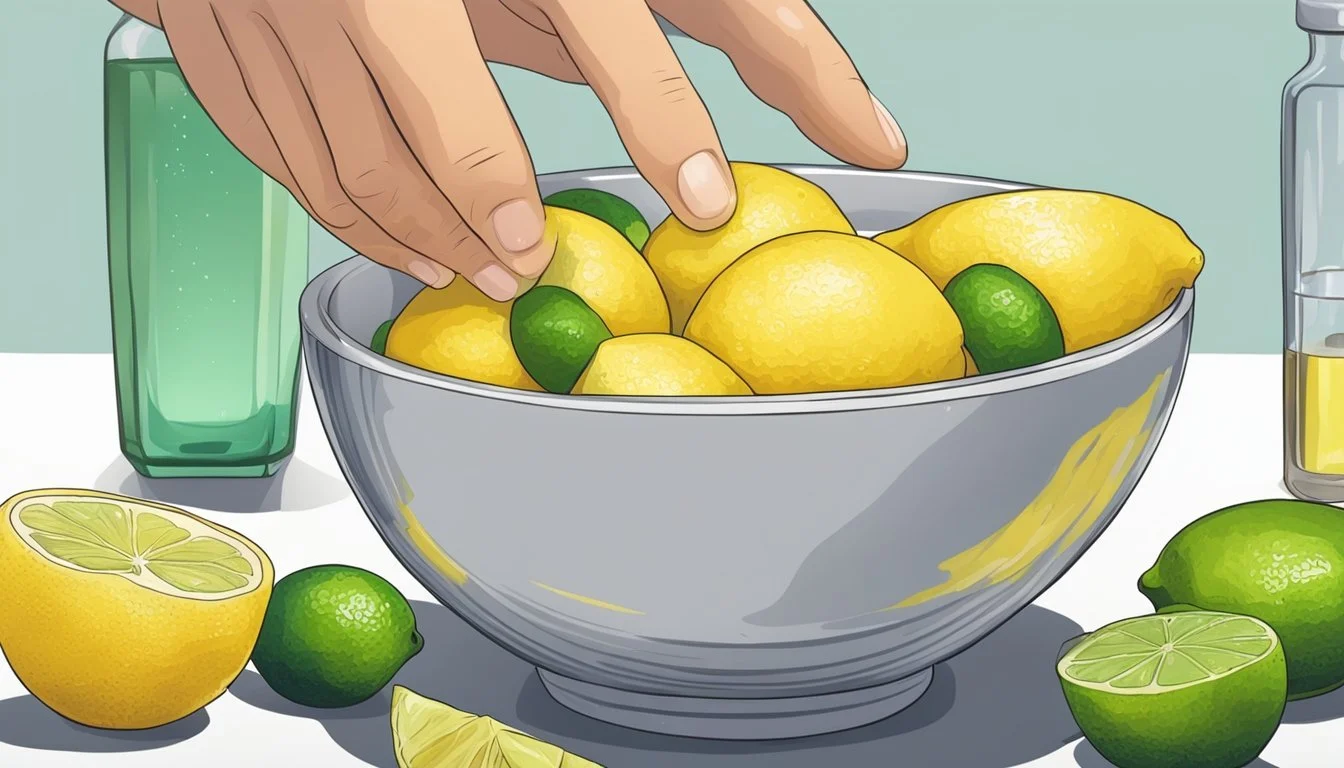Lime Juice Substitutes
Top Alternatives for Your Recipes
Lime juice is a versatile ingredient that brings a vibrant tanginess to an array of dishes and beverages. From the zest of your marinades to the sparkle in your favorite cocktails, it plays an integral role in many recipes. Yet, there are occasions when lime juice isn't readily available or an alternative is desired due to dietary restrictions or personal preference.
That's where lime juice substitutes come into play, offering both versatility and convenience for the home cook and professional chef alike. Different substitutes can provide similar acidic brightness or fruity zest to a dish. Substitutes such as lemon juice, orange juice, and various vinegars like white wine vinegar and apple cider vinegar can fill in the gap when lime juice is called for in a recipe. It's often recommended to start with a small amount and adjust to taste, as the intensity and flavor profile can vary with each alternative.
Moreover, for those looking to maintain the distinct lime character without the juice, lime zest can be an effective replacement, imparting a citrusy aroma and flavor to any dish. Certain recipes that demand a subtle citrus note can also benefit from other citrus juices like grapefruit, particularly in cocktails and seafood dishes. Understanding which substitute to use can ensure that the desired outcome of the recipe is achieved without compromising on flavor.
Understanding Lime Juice and Its Culinary Uses
In the culinary world, lime juice is prized for its unique combination of tartness, flavor, and acidity that enhances a variety of dishes and beverages. Its contribution goes beyond just taste as it injects a fresh and vibrant character into culinary creations.
Culinary Importance of Lime Juice
Lime juice is a staple in global cuisine thanks to its ability to bring a bright, acidic taste to food and drinks. It is rich in vitamin C, offering a healthy dimension to its culinary use. The inclusion of lime juice in recipes is often crucial for achieving the desired balance of flavor, especially in Mexican cuisine and Thai cooking, where its presence is almost ubiquitous.
Key Attributes of Lime Juice
The sour and tart profile of lime juice, along with its distinctive citrus flavor, sets it apart from other acids used in the kitchen. Its acidity is necessary for cutting through the richness of savory dishes and adding a freshness that can elevate the entire dish. Lime juice also imparts an alluring aroma that can enhance the sensory experience of a meal.
Common Lime Juice Applications
Here are representative uses of lime juice within various culinary applications:
Cocktails: It provides a zesty kick that balances sweet and alcoholic components.
Salads and marinades: Lime juice acts as an acidic component that can tenderize proteins and meld flavors together.
Salsas and savory dishes: Its tartness complements the heat and spice often found in these dishes, providing a refreshing contrast.
Desserts and baking: Lime juice adds a pleasant acidity that can punctuate the sweetness and richness in various baked goods.
Citrus fruits: When paired with other citrus fruits, lime juice can create a complex, layered citrus flavor profile ideal for many dishes.
Popular Lime Juice Substitutes
When looking for a lime juice substitute, one may consider options based on similarity in flavor, acidity, and how they interact with other ingredients. The substitutes range from other citrus fruits to vinegars and alternative fruit juices, each offering a distinct taste and level of acidity.
Citrus-Based Substitutes
Lemon Juice: It closely mimics the tartness and acidity of lime juice. Typically, a 1:1 ratio can be used when substituting lemon juice for lime juice.
Orange Juice: While sweeter, orange juice offers a citrus flavor that can soften the absence of lime. Use it in salads and baked goods.
Grapefruit Juice: This substitute provides a less tart option and is great for cocktails and seafood dishes.
Lemon Zest: Packed with oils, lemon zest delivers an intense flavor perfect for dressings and marinades.
Citrus Zest: The zest of citrus fruits, like oranges or grapefruits, can serve as a lime zest substitute.
Vinegar-Based Substitutes
Apple Cider Vinegar: A mild and slightly fruity option that can serve as a stand-in during cooking.
White Vinegar: Stronger and more pungent, it should be used sparingly.
White Wine Vinegar: Its mild flavor and slight sweetness make it ideal for dressings and sauces.
Other Fruit Juices as Alternatives
When citrus is not available, other fruit juices may suffice.
Tamarind Paste: For a tropical twist, tamarind paste can impart a similar sourness to dishes.
Unique Substitutes and Exotic Alternatives
Bitter Orange Juice: Popular in Latin cuisine, this offers a unique flavor profile where lime is traditionally used.
White Wine: In certain recipes, white wine can provide the necessary acidity and complexity.
Remember, when using these substitutes, it's about balancing flavor and acidity to achieve a result similar to lime juice’s effect in a dish.
Substituting Lime Juice in Specific Dishes
When a recipe calls for lime juice, the chosen substitute can make a significant difference in the final result. Ingredients vary in acidity, sweetness, and flavor, so selecting the appropriate alternative is crucial for maintaining the integrity of the dish.
Alternatives for Marinades and Dressings
For marinades and dressings, where lime juice contributes a sour and tangy flavor, lemon juice is typically the most compatible substitute. It provides a similar acidity level, benefiting meats or salads with the expected citrus punch. In dressings, especially those paired with green salads, a blend of vinegar—such as white wine vinegar—and a pinch of sugar can replicate the zesty tang of lime juice, while also adding a layer of complexity.
Marinade Example: Use lemon juice in equal measure to lime juice.
Dressing Example: Combine white wine vinegar with a small amount of sugar as a lime juice alternative.
Substitutes in Baking and Desserts
When preparing baked goods such as pies, cakes, or cookies, replacing lime juice with other citrus juices can affect both the flavor and the chemistry of the dessert. Lime zest can provide the citrus flavor without significantly altering the liquid balance in the recipe. Alternatively, for a less tart result, orange juice can be used, but it is sweeter, so you may want to reduce the sugar content elsewhere in the recipe.
Pie Example: Substitute lime zest for lime juice in key lime pie to retain the citrus flavor.
Cake Example: Orange juice can replace lime juice, adjust sugar accordingly.
Swapping Lime Juice in Beverages
In beverages like margaritas and limeade, or when adding lime juice in cocktails, the citrus element is key. If lime juice is unavailable, other citrus fruit juices can be effective, albeit with a different flavor profile. For a very similar taste, lemon juice can be used. To subtly change the drink's character, a combination of citrus juices such as orange juice can introduce both sourness and sweetness.
Margarita Example: Use freshly squeezed lemon juice as a straight swap for lime juice.
Limeade Example: Mix and match with other citrus fruit juices to balance sourness and sweetness.
Adapting Substitutes for Savory Recipes
In savory dishes like guacamole, stews, and various meat preparations, the goal is to complement the primary flavors without overpowering them. Where the dish calls for a hint of lime, lime zest can again step in to give that citrus aroma. For a more pronounced tanginess, white wine vinegar can be utilized, but start with half the amount and taste as you go. Remember that the sweetness often found in lime juice should be considered and replicated, if necessary, by adding a bit of sugar.
Guacamole Example: Mix in lime zest to achieve the bright, fresh flavor.
Savory Recipes Example: Use white wine vinegar, in moderation, to introduce acidity.
Adjusting Taste and Acidity with Substitutes
When substituting lime juice in recipes, one should pay attention to the balance of sourness and sweetness, as well as to maintaining the desired level of acidity. The goal is to achieve a taste profile that closely mimics the unique tangy flavor of lime juice.
Balancing Sourness and Sweetness
To match the sourness of lime juice, lemon juice is often the best substitute due to its similar acidic taste. If a recipe requires less sourness, orange juice can be used, as it provides a sweeter flavor with a mild citrus flair, but may require the addition of a tart component like a pinch of citric acid to achieve the perfect balance. Here is how one can substitute while balancing the sour and sweet notes:
Lemon Juice: 1:1 ratio for lime juice.
Orange Juice: mix with a tart agent as needed, such as lemon zest or citric acid.
For dishes that benefit from a sweet yet tangy note, a mixture of grapefruit juice and a small amount of sugar can replace lime juice effectively. The grapefruit has a tartness akin to lime, while sugar can be adjusted to achieve the desired sweetness level.
Maintaining Desired Acidity Levels
When specifically looking at acidity, apple cider vinegar and red wine vinegar can serve as substitutes, although they should be used in smaller quantities due to their potent acidic taste and should be diluted with water or mixed with mild juice to mimic the more nuanced profile of lime juice. Here's a practical guide:
Substitute Starting Ratio Tips for Use Apple Cider Vinegar 1 part vinegar to 2 parts water Dilute first, then adjust to match lime juice acidity. Red Wine Vinegar 1 part vinegar to 2 parts water Begin with less, add incrementally.
It's important to start with lesser amounts of these vinegar substitutes and taste as you go, adjusting the levels to align closely with the culinary function lime juice serves in the dish, whether as a marinade, in dressings, or as a fresh flavor enhancer.
Health Considerations and Nutritional Aspects
When considering alternatives to lime juice, one must take into account the health implications and nutritional profiles of the substitutes. These include the Vitamin C content, antioxidant properties, and how they might influence immunity and overall health.
Vitamin C Content in Substitutes
Lemons: A top substitute for lime juice, lemon juice is nearly equivalent in Vitamin C content and can seamlessly fulfill the nutritional aspect of recipes.
Grapefruits: While grapefruit juice has a milder tartness, it offers a good amount of Vitamin C, although typically less than lime juice, making it a decent alternative where health benefits are concerned.
Considering the Antioxidant Properties
Oranges: Orange juice, although sweeter, still possesses Vitamin C and other antioxidants which are vital for combating oxidative stress in the body.
Grapefruits: The juice is rich in antioxidants, contributing to its value as a substitute in terms of promoting health and freshness in dishes.
Implications for Immunity and Health
Substitutes with high Vitamin C and antioxidant levels can support the immune system. Freshly squeezed juices from lemons and grapefruits are particularly beneficial, maintaining most of the nutrients intact unlike some processed options, thus better supporting overall health. It's essential to evaluate the freshness and quality of the substitutes to maximize these health benefits.
Creative Uses of Lime Juice Substitutes Beyond Cooking
While lime juice is a staple in culinary recipes, its substitutes bring versatility not only to food and beverages but also in cleaning and home management. These alternatives provide more than just a unique taste; they can be essential in innovative beverage creations and practical household tasks.
Innovative Beverage Creations
Substitutes for lime juice like lemon juice or grapefruit juice can be used to invent refreshing beverages. A great example is homemade limeade where substitutes successfully impart a citrus flair to the drink. When it comes to cocktails, options such as orange juice or a mix of citrus zest can replace lime juice while still achieving a balanced tang—a key for favorites like margaritas. For an elegant touch, use white wine or vinegar for a complex taste profile in mixed drinks.
Beverage Idea: Homemade Grapefruit Limeade
Ingredients: Grapefruit juice, water, sweetener of choice
Instructions: Mix equal parts of grapefruit juice and water, sweeten to taste.
Cocktail Twist: Citrus Zest Margarita
Ingredients: Tequila, triple sec, citrus zest (lemon, orange), ice
Instructions: Shake all ingredients, serve over ice with a zest garnish.
Alternative Uses in Cleaning and Household Tasks
Beyond the realm of cooking and drinks, lime substitutes also shine in cleaning and maintenance. For instance, the acidic properties of white wine vinegar can be used as a natural cleaning agent to remove hard water stains or grease. Lime oil and lime extract, with their concentrated scents, serve as air fresheners and natural disinfectants.
Natural Cleaner: Vinegar Grease Remover
Ingredients: Equal parts white wine vinegar, water
Use: Spray on greasy surfaces, wait a few minutes, wipe clean.
Air Freshener: Lime Extract Scent
Ingredients: Lime extract, water, spray bottle
Instructions: Mix a few drops of lime extract with water in a spray bottle for a DIY air freshener.
These creative applications showcase the versatility of lime juice substitutes beyond the kitchen, demonstrating that their usefulness certainly extends further than just adding a twist to key lime pie or key lime juice in recipes.
Tips for Selecting and Storing Substitutes
When seeking an alternative to lime juice, the goal is to find a substitute that closely matches the unique taste and citrus flavor of lime, while ensuring that the freshness and aroma are preserved through proper storage.
Choosing the Best Substitute for Your Needs
Different substitutes for lime juice can be appropriate depending on the context of the dish and desired flavor profile. For instance:
Lemon Juice: Offers a similar citrus flavor and can be used in a 1:1 ratio.
Grapefruit Juice: Provides a less tart taste and is suitable for cocktails and dressings.
Bottled Lime Juice: Convenient but may lack the vibrancy of fresh juice.
Lime Juice Powder: Good for dry seasoning mixes and when liquid content is a concern.
Key Limes: Smaller and more aromatic, providing a more intense lime flavor.
Black Lime: Offers a fermented, sour taste, ideal for Middle Eastern dishes.
One should always taste and adjust the quantity based on the recipe and personal preference to ensure the integrity of the dish's taste is maintained.
Proper Storage Methods to Retain Freshness and Flavor
Preserving the substitutes' freshness and flavor requires attention to storage:
Substitute Storage Method Shelf Life Lemon Juice Refrigerate in airtight container 2-3 days Grapefruit Juice Refrigerate and use within 2-3 days Up to 1 week Bottled Lime Juice Keep tightly sealed, refrigerated See expiration Lime Juice Powder Dry, cool place away from light Several months Key Limes Refrigerate in plastic bag 1-2 weeks Black Lime Airtight container in a cool, dry place Up to 2 years
For liquid substitutes, ensuring they are stored in airtight containers and refrigerated will help maintain their aroma and prevent spoilage. Solid substitutes like powders or dried limes should be kept in a cool, dry environment to preserve their unique taste. It's important to always check the substitute's condition before use to ensure the best quality is being added to the dish.
Conclusion
When cooking or baking, one may find themselves without lime juice, a key acidic and flavor component. A variety of substitutes are available that can fulfill the role of lime juice in recipes. Cooks can opt for the readily available lemon juice as a direct replacement due to its similar flavor profile.
Citrus alternatives like orange or grapefruit juice are suitable substitutes, offering a sweeter taste, while white wine vinegar or other vinegars provide the necessary acidity. These alternatives may need to be adjusted depending on the desired outcome of the dish.
For those looking into baking applications, it's critical to note that if a recipe includes baking soda, the substitute should also have acidic qualities to ensure the proper chemical reaction.
Here is a concise list of replacements:
Lemon juice: A one-to-one substitute, ideal for most uses of lime juice.
Vinegar: A more pungent alternative, best used in small quantities.
Citric Acid: Useful for a tart, sour flavor without additional liquid.
In some cultural cuisines, tamarind or black lime are unique, tangy options, adding not only acidity but also an exotic flavor twist to dishes. Understanding the role of lime juice as a liquid component in recipes allows one to navigate across various alternatives with confidence, ensuring the original character of the dish remains intact.







